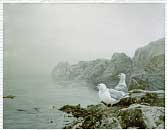Advertising was also the subject of another article in the Washington Post:
"Former vice president Al Gore will launch a three-year, $300 million campaign Wednesday aimed at mobilizing Americans to push for aggressive reductions in greenhouse gas emissions, a move that ranks as one of the most ambitious and costly public advocacy campaigns in U.S. history."
Gore says, "The simple algorithm is this: It's important to change the light bulbs, but it's much more important to change the laws."
"The Alliance for Climate Protection's "we" campaign will employ online organizing and television advertisements on shows ranging from "American Idol" to "The Daily Show" with Jon Stewart. It highlights the extent to which Americans' growing awareness of global warming has yet to translate into national policy changes, Gore said in an hour-long phone interview last week. He said the campaign, which Gore is helping to fund, was undertaken in large part because of his fear that U.S. lawmakers are unwilling to curb the human-generated emissions linked to climate change.
"This climate crisis is so interwoven with habits and patterns that are so entrenched, the elected officials in both parties are going to be timid about enacting the bold changes that are needed until there is a change in the public's sense of urgency in addressing this crisis," Gore said. "I've tried everything else I know to try. The way to solve this crisis is to change the way the public thinks about it.""
I'm so glad to hear this -- I'm glad to hear he's putting his peace prize to good use (he's putting in all the profits from the film, the book, the prizes -- according to the article.) I'm glad to think there is someone out there fighting this fight -- with big bucks and brains an know how. Also -- just in terms of government faith and healing, it's good to hear of someone exceeding expectations rather than falling short!As a mother of young children I think about advertising all the time -- what the kids see and what they do -- who tries to sell them what and when. Junk, always. Consumerism all the time.
Isn't it nice to imagine that aside from the barrage of barbie and webkins (whose sole purpose of gaming is to sell more and make a game of buying!) -- that some of the advertising they receive over their childhood could actually be good information as well. One of the campaign's partners is the Girl Scouts. (I think we need a new cookie! Maybe an oil cookie?)
Furthermore, isn't it a refreshing opinion of democracy! People need to decide. If we do decide -- en mass -- we can effect change. We can vote and change the outcome of the future!

































